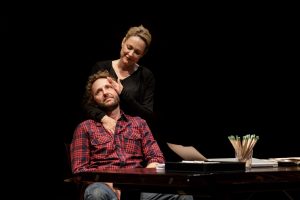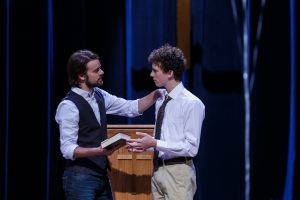In La Jolla Playhouse “Kingdom City,” Censorship Brings Its Usual Result
The bedrock reality of censorship is that it doesn’t work. Things learned cannot be unlearned. Confused, distorted, condemned, even forgotten, but never erased.
So battles over access to knowledge ultimately are nothing but struggles for power. Check out the early part of Geneses in the Bible.
Or catch Sheri Wilner’s new play Kingdom City, now at the La Jolla Playhouse. It’s a raggedy play in a problematic production but it does address the issue: A creative couple from Manhattan are dropped into a rural Missouri town where he’s a visiting scholar at the local college and she’s hired to direct the high school play. A showdown with local religious troops ensues and, while individual lives are changed, no real winner, as usual, can be proclaimed.
The subject of the controversy is, of all things, Arthur Miller’s The Crucible, a major masterpiece of the American theatre and an educational staple revered both for its art and its ethics. But it’s not Miller’s flinty disgust for community hysteria that riles the waters. Instead, it’s a kiss. John Proctor, finally resolved to execution rather than craven falsehood, kisses his wife farewell. Passionately.
So the fuss is over a stage direction. A boy actor confesses his nervousness, a swaggering charismatic demands to watch rehearsals and the visiting director refuses.
Perhaps Wilner chose such a ridiculous quibble to illustrate the core absurdity of the whole exercise. In doing so, though, she sets aside all the moral power of Miler’s play and settles for a PTA squabble.
Ah, but there’s subtext aplenty. The woman’s career has been seriously sagging due to her hesitation to commit to a project (I’m not sure why she’s still being called.) Her husband is cruelly blocked on a writing project that has gone sour with years of frustration. A feral teenage actress needs this credit to get into Juilliard and she’s not open to alternative plans.
The glittering serpent in the mix is a flamboyantly reborn fundamentalist who with sleek charisma teaches the local kids Purity, complete with rings, songs and white balloons. There’s no sin that this guy doesn’t claim to have survived, and he’d probably stay up all night giving details. He wants every scrap of childish secrets from his flock so that they can make informed decisions on their lives, their precious innocence intact. Probably, he sees the contradictions here but he’s after bigger game and more power.
“When he saw you all dressed in black, drinking coffee and reading The New Yorker,” this guy tells the director, “even the sheriff was intimidated.” She’s a worthy foe, at last.
Well, the business plays out with – altogether now – NO WINNERS. But, if truth counts as points, there is an agreeable score. Eyes are opened, poses unmasked, new understandings reached and there may even be a crack in the writer’s block. The community of Kingdom City may not be such a monolith of orthodoxy after all. Life proceeds. A revived New York career? An admission to Juilliard? We’ll have to wait and see. Anything is possible.
What I like about the play is the way it drags all this out and forces yet another examination. Most adults have encountered these dilemmas before. (Certainly I recognize a few!) They develop differently, in our instant information era, but the paths remain the same, ancient even when Arthur Miller’s John Proctor trod them.
Some of Wilner’s characters need work. (That drama queen should have the extravagant act-out stuffed back securely inside where it can build pressure.) The addition of a few more roles might help the story’s coherence. But the biggest problem right now is this production.
Whoever decided to arrange the Potiker Theatre into a long arena, with audience on either side grandstand style, needs to rethink. This is a play of small, intimate scenes and being stuck on the 20-yard line when the action is downfield on the other goal line, is problematic.
Director Jackson Gay hasn’t found many solutions. Characters get frozen into place too long and the possibilities of open space are ignored. One can sense the actors trying to fill and share, but there’s just no hope for intimacy.
Robert Brill hasn’t helped with a set that’s mostly furniture to haul around and a formidable stone wall being built, probably symbolically, at one far end. (Nice work, though, Tidwell Masonry.) Given the circumstances, Paul Whitaker just focuses the needed pools of light and tries to shape the large scenes.
Despite this, all the actors bring commendable performances. Kate Blumberg and Todd Weeks are instantly recognizable as East Coast intellectual strivers wary of their wilderness survival needs who meet the crunch of self-confrontation with sweetly domestic resolution.
Cristina Gerla and Austyn Myers surrender themselves earnestly to the demands of repressed youth amidst conflicting input. Katie Sapper, given license to be the high school ingénue from hell, gamely proceeds accordingly, up to the edge of wince.
The snake gets the best stuff, of course. Ian Littleworth is fascinating to watch as he lays snares with sweet reason, his rhetoric expanding carefully as the screws tighten. His easy way with hip patois and his quick wit, plus a steely will, make his victims underdogs. He handles all this, plus further developments, with admirable skill.
And finally, a word about the finale. I won’t describe it because it works so nicely. But pay attention. In some respects, the redemption and renewal hinted at is what makes all the misery worth enduring. Brava, actors, author and director.
[box] Continues at 7:30 p.m. Tuesdays and Wednesdays, at 8 p.m. Thursdays-Saturdas, at 2 p.m. Saturdays and Sundays, and at 7 p.m. Sundays through Oct. 5, 2014.[/box]

Welton Jones has been following entertainment and the arts around for years, writing about them. Thirty-five of those years were spent at the UNION-TRIBUNE, the last decade was with SANDIEGO.COM.




